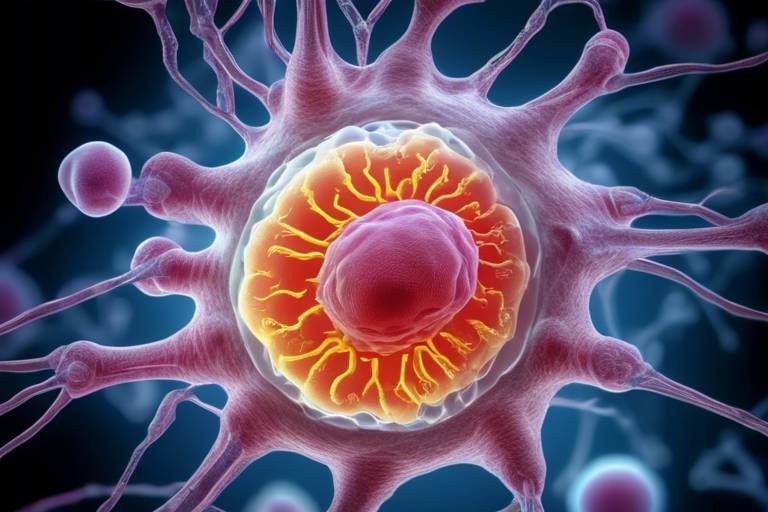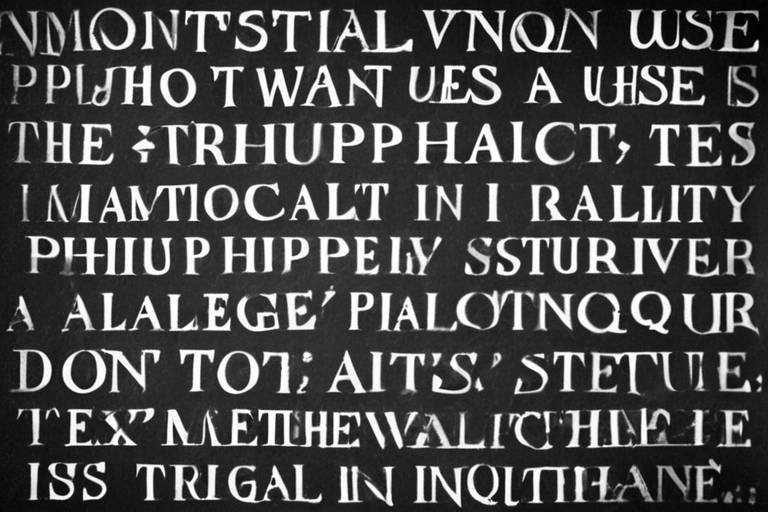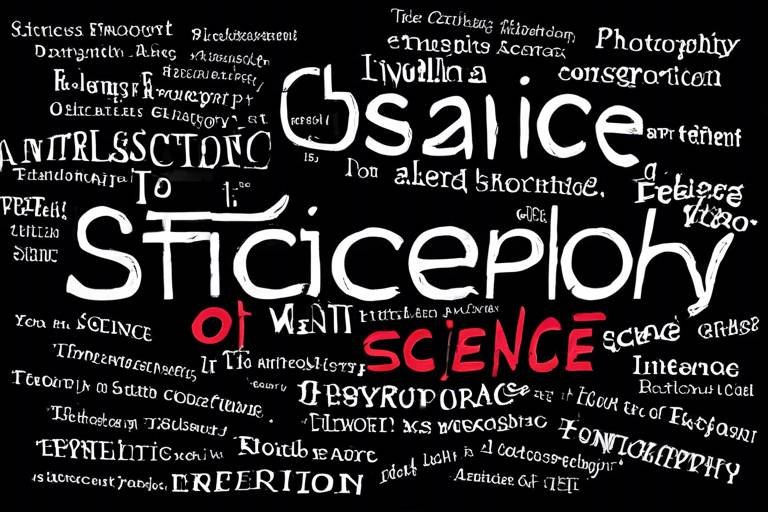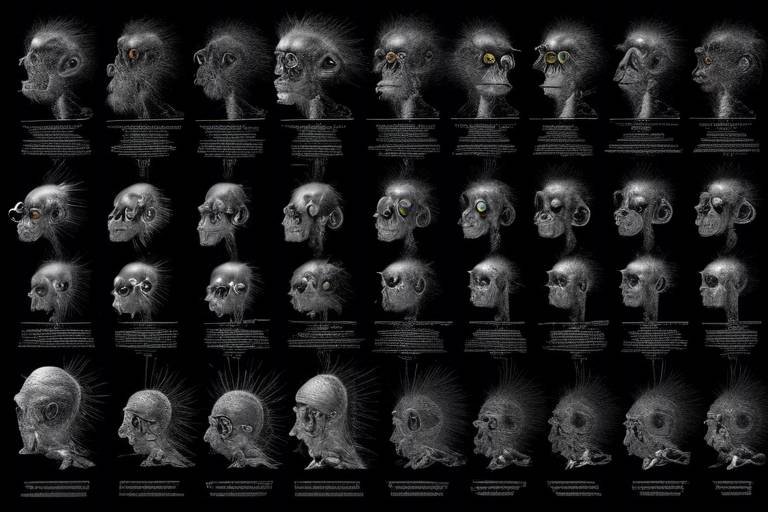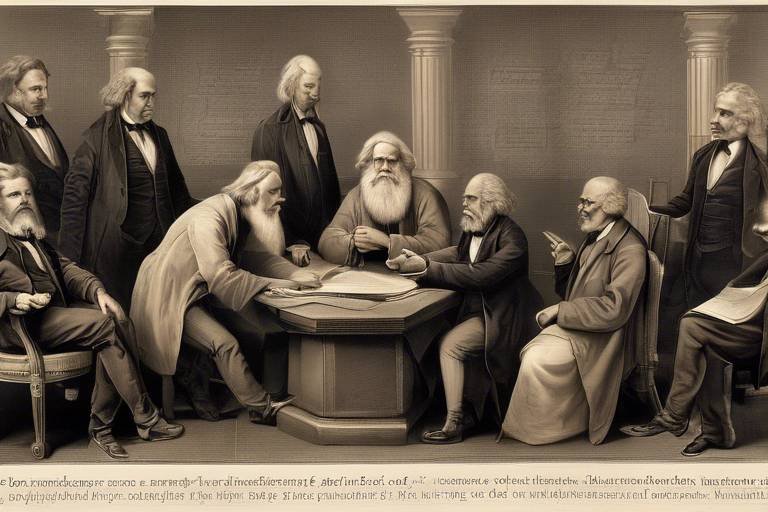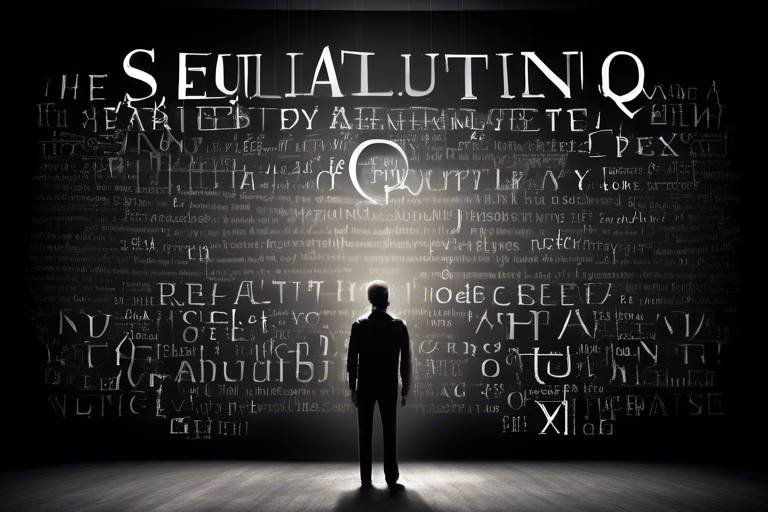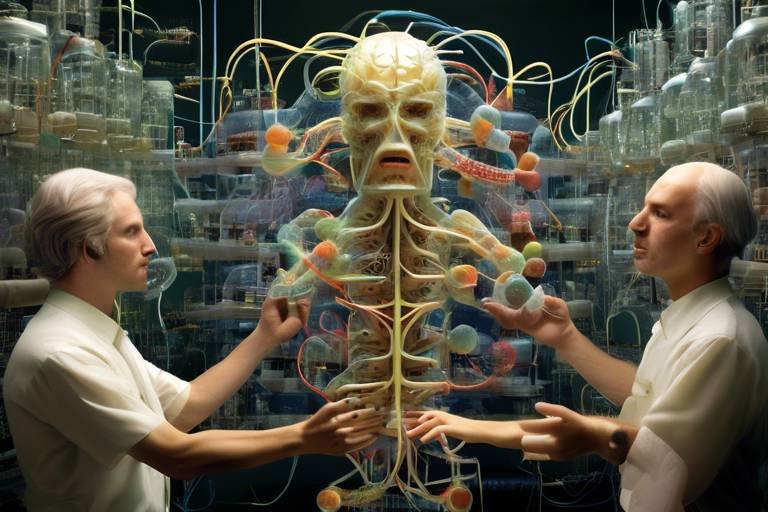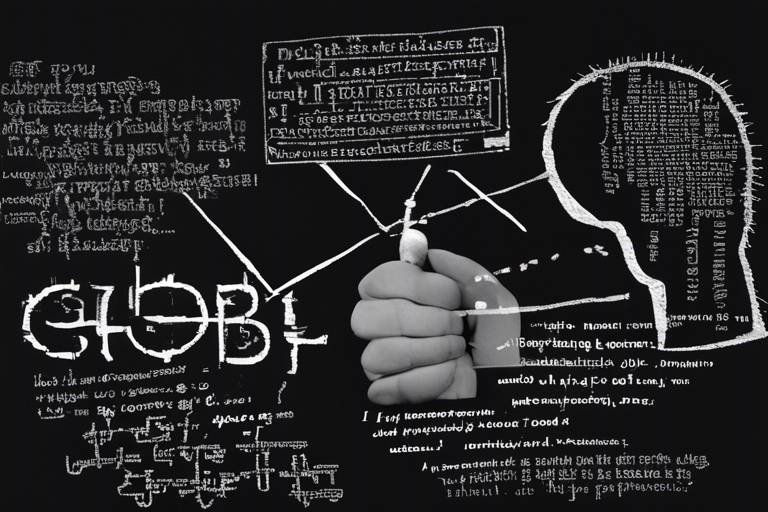The Philosophy of Healing - How Does Medicine Restore Health?
The intricate relationship between philosophy and medicine has fascinated thinkers and practitioners for centuries. At its core, healing is not just about treating symptoms or curing diseases; it’s a profound journey that intertwines the physical, mental, and emotional aspects of a person. Imagine for a moment that our bodies are like intricate machines, where every cog and wheel must function in harmony for optimal performance. When one part falters, the entire system can be thrown off balance. This is where the philosophy of healing comes into play—it's about restoring that balance and ensuring that every aspect of a person is considered in the quest for health.
Healing practices have evolved dramatically over the ages, reflecting the changing understanding of what it means to be healthy. From the ancient healers who relied on the natural world to modern medical professionals equipped with advanced technology, the philosophy behind healing has always emphasized the importance of holistic approaches. This means looking beyond just the physical ailments and considering the psychological, social, and spiritual dimensions of health. After all, how can one truly heal if the mind is troubled or the spirit is weary?
Consider this: when we experience stress or emotional turmoil, it often manifests in physical symptoms. Headaches, digestive issues, and even chronic pain can be traced back to our mental state. This is why the exploration of the mind-body connection is so critical. By understanding how our thoughts and emotions influence our physical health, we can adopt more comprehensive healing practices. This is not just a modern idea; ancient philosophies have long recognized this connection. For instance, practices like yoga and meditation have roots in traditions that emphasize harmony between the mind and body, showcasing that the journey to health is as much about emotional and mental well-being as it is about physical treatment.
Traditional healing practices, such as acupuncture and herbal medicine, serve as prime examples of this philosophy in action. These methods are built on the premise that health is a state of balance and harmony. They often focus on restoring equilibrium within the body, rather than merely alleviating symptoms. Let’s take a closer look at how ancient philosophies like Ayurveda and Traditional Chinese Medicine have shaped our understanding of health:
| Philosophy | Core Principle | Healing Approach |
|---|---|---|
| Ayurveda | Balance of Doshas | Herbal remedies, diet, and lifestyle changes |
| Traditional Chinese Medicine | Yin and Yang | Acupuncture, herbal medicine, and Qi Gong |
These ancient systems offer a unique perspective on health, emphasizing the interconnectedness of the body, mind, and environment. They remind us that healing is not just about the absence of disease; it's about achieving a state of well-being that encompasses all aspects of life. As we move into the modern era, we see a fascinating trend where traditional wisdom is being integrated with contemporary medical practices. This modern integrative approach combines the best of both worlds, showcasing how the philosophy of healing continues to evolve.
However, with the advancements in medical technology, ethical considerations have become paramount. As practitioners navigate the complexities of modern medicine, they must prioritize patient well-being and adhere to the principles of healing. This brings us to the ethical dilemmas that often arise in medical practice. How do we balance technological advancements with the human touch? How can we ensure that every patient feels valued and understood in a world that is increasingly driven by data and algorithms?
In conclusion, the philosophy of healing is a rich tapestry woven from the threads of history, tradition, and modernity. It challenges us to look beyond the surface, to consider the whole person in our quest for health. As we continue to explore the depths of this philosophy, we must remain open to learning and adapting, ensuring that the future of healing is not just effective but also compassionate.
- What is the mind-body connection? The mind-body connection refers to the relationship between a person's thoughts, emotions, and physical health. It highlights how psychological factors can influence physical well-being.
- How do traditional healing practices differ from modern medicine? Traditional healing practices often focus on holistic approaches that consider the entire person, while modern medicine tends to emphasize symptom management and disease treatment.
- What role does technology play in modern healing? Technology enhances diagnosis and treatment options, but it also raises ethical questions about maintaining the human connection in healthcare.
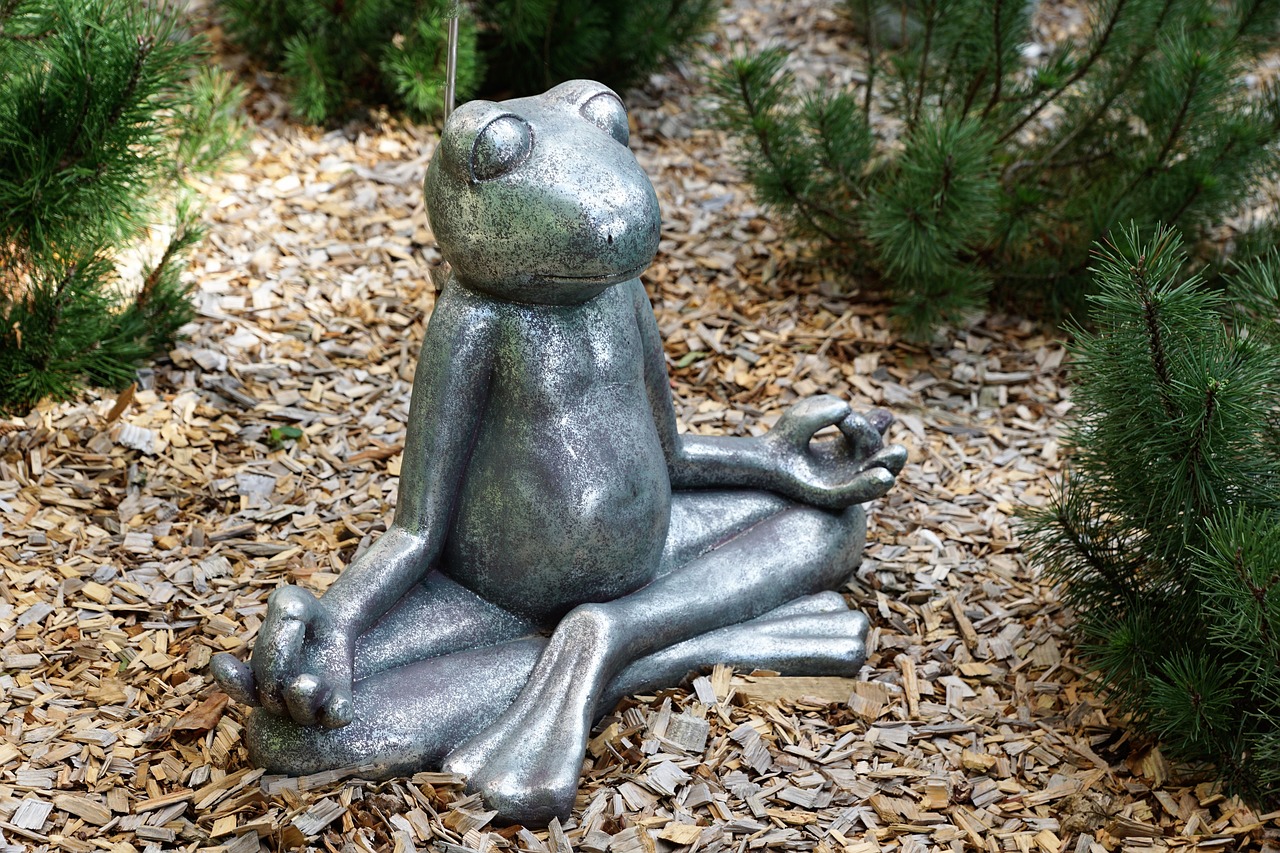
The Historical Context of Healing
Understanding the historical evolution of healing practices offers profound insights into how ancient philosophies laid the groundwork for modern medicine and its approach to health restoration. From the dawn of civilization, people have sought ways to alleviate suffering and restore health, often intertwining their medical practices with spiritual beliefs and cultural traditions. This intricate relationship between philosophy and healing is not merely a backdrop; it is a vibrant tapestry that reflects humanity's quest for understanding the mysteries of life and health.
In ancient times, healing was often viewed through a mystical lens. Early healers were typically shamans or priests who combined their knowledge of herbs with spiritual rituals. This blend of the physical and metaphysical highlights a key philosophical tenet: that health is not just the absence of disease but a state of balance and harmony. For instance, ancient Egyptian medicine utilized a combination of practical remedies and spiritual incantations, emphasizing the belief that the body and soul were interconnected.
As we delve deeper into history, we encounter various cultures and their unique approaches to healing. The Greeks, particularly Hippocrates, began to shift the focus toward observation and rationality, laying the foundation for what we now recognize as clinical medicine. Hippocrates famously stated, “It is more important to know what sort of person has a disease than to know what sort of disease a person has.” This perspective underscores the importance of understanding the individual in the healing process, a principle that resonates strongly in today’s holistic approaches.
In the East, traditional systems like Ayurveda and Traditional Chinese Medicine (TCM) emerged, emphasizing the balance of elements within the body and the concept of Qi (life force). These practices advocate for a comprehensive view of health, integrating diet, lifestyle, and mental well-being into their therapeutic practices. The philosophies behind these systems reveal a profound understanding of the interconnectedness of body, mind, and environment, which many modern practitioners are now beginning to appreciate.
To illustrate the evolution of healing practices, consider the following table that highlights key developments in various cultures:
| Culture | Key Contributions | Philosophical Underpinnings |
|---|---|---|
| Ancient Egypt | Herbal remedies, spiritual healing | Interconnection of body and soul |
| Ancient Greece | Clinical observation, Hippocratic oath | Rationality and individual focus |
| Traditional Chinese Medicine | Acupuncture, herbal medicine | Balance of Qi and harmony |
| Ayurveda | Holistic health, dietary practices | Interconnectedness of body and environment |
As we move into the modern era, the influence of these ancient philosophies continues to be felt in contemporary medicine. The rise of integrative health practices reflects a growing recognition of the importance of treating the whole person rather than merely addressing symptoms. This shift represents a philosophical evolution in medicine, one that acknowledges the complexity of human health and the multifaceted nature of healing.
In conclusion, the historical context of healing is rich and varied, shaped by cultural beliefs, philosophical insights, and the relentless pursuit of understanding health. By appreciating these historical roots, we can better comprehend the diverse healing practices available today and the philosophical frameworks that continue to guide them.

The Role of Mind-Body Connection
The mind-body connection is a fascinating and complex relationship that plays a crucial role in our overall health and well-being. Imagine your mind and body as two dancers in a beautifully choreographed performance; when they move in harmony, everything feels right. However, when one dancer falters, the entire performance can be thrown off balance. This intricate connection means that our thoughts, emotions, and beliefs can significantly influence our physical health. For instance, stress and anxiety can manifest as physical ailments, while positive emotions can promote healing and recovery.
Research has shown that psychological factors can impact physical health in profound ways. Consider the following aspects of this connection:
- Emotional Well-being: Positive emotions can boost the immune system, while negative emotions can lead to inflammation and other health issues.
- Stress Management: Chronic stress can lead to various health problems, including heart disease and digestive issues. Learning to manage stress through techniques like meditation or yoga can improve physical health.
- Beliefs and Expectations: The placebo effect is a prime example of how our beliefs can influence our health. When patients believe they are receiving effective treatment, they often experience real improvements in their conditions.
Incorporating holistic approaches into healing practices acknowledges this mind-body connection. For example, many traditional healing practices emphasize the importance of mental and emotional health in achieving physical well-being. Techniques such as mindfulness meditation, yoga, and tai chi not only promote relaxation but also foster a deeper awareness of the body and its needs.
Moreover, the concept of embodied cognition suggests that our cognitive processes are deeply rooted in our bodily experiences. This means that our physical state can influence our thoughts and emotions, creating a feedback loop that can either enhance or hinder our healing journey. For instance, engaging in physical activity can elevate mood and improve mental clarity, while a sedentary lifestyle may contribute to feelings of lethargy and depression.
As we explore the mind-body connection, it becomes evident that addressing both mental and physical health is essential for comprehensive healing. This holistic perspective not only enriches our understanding of health but also empowers individuals to take charge of their well-being. By recognizing the profound impact of the mind on the body, we can develop more effective healing practices that focus on the whole person, rather than just isolated symptoms.
In conclusion, the mind-body connection is a powerful aspect of healing that cannot be overlooked. By fostering this connection through various practices and therapies, we can create a more balanced and harmonious approach to health restoration, ultimately leading to a more fulfilling and vibrant life.
- What is the mind-body connection? The mind-body connection refers to the relationship between a person's thoughts, emotions, and physical health.
- How can I improve my mind-body connection? Practices like meditation, yoga, and mindfulness can enhance the mind-body connection by promoting relaxation and self-awareness.
- Can stress really affect my physical health? Yes, chronic stress can lead to various health issues, including heart disease and digestive problems.
- What is the placebo effect? The placebo effect occurs when a patient experiences real improvements in their condition due to their belief in the effectiveness of a treatment, even if the treatment has no therapeutic value.

Traditional Healing Practices
Traditional healing practices have stood the test of time, offering profound insights into the art of restoring health. These practices are not just about treating symptoms; they embody a holistic approach that emphasizes the balance of body, mind, and spirit. Imagine a tapestry woven with threads of ancient wisdom, cultural beliefs, and natural remedies. This is the essence of traditional healing. From acupuncture to herbal medicine, these practices highlight the philosophical foundations that prioritize harmony and equilibrium in the quest for well-being.
At the heart of these traditional methods lies the understanding that health is not merely the absence of disease but a state of complete physical, mental, and social well-being. For instance, acupuncture, a practice rooted in Traditional Chinese Medicine (TCM), operates on the principle of Qi, or vital energy, flowing through meridians in the body. When this flow is disrupted, illness can occur. By inserting fine needles at specific points, practitioners aim to restore balance and promote healing. This practice illustrates how traditional healing is deeply intertwined with philosophical concepts, viewing the body as an interconnected system rather than a collection of isolated parts.
Herbal medicine, another cornerstone of traditional healing, utilizes plants and natural substances to promote health. This approach is not just about the physical properties of herbs; it also considers the individual's unique constitution and the environmental factors influencing health. For example, in Ayurveda, an ancient Indian system of medicine, the choice of herbs is tailored to the patient's dosha, or body type, which reflects a person's physical and emotional characteristics. This personalized approach underscores the belief that healing is a collaborative journey between the healer and the patient, rooted in understanding and respect.
Moreover, traditional healing practices often involve community participation and cultural rituals that enhance the healing experience. Think of it as a communal dance where everyone plays a role in restoring health. Whether it's through group meditation, traditional ceremonies, or family support during recovery, these practices foster a sense of belonging and emotional support, which are crucial for healing. The integration of social and cultural elements into the healing process highlights the importance of context in health restoration, reminding us that we are not just individuals but part of a larger community.
As we delve deeper into these practices, it is essential to recognize their relevance in today's world. While modern medicine has brought remarkable advancements, the wisdom of traditional healing offers valuable lessons. By embracing a more integrative approach, combining the best of both worlds, we can enhance our understanding of health and well-being. This philosophy encourages us to look beyond the symptoms and consider the whole person, paving the way for a more compassionate and effective healthcare system.

The Influence of Ancient Philosophies
When we delve into the realm of ancient philosophies, we uncover a treasure trove of wisdom that has shaped healing practices across cultures. These philosophies, often intertwined with spirituality and nature, emphasize the interconnectedness of the body, mind, and environment. Take, for instance, Ayurveda, an ancient Indian system of medicine that promotes balance among bodily energies, or doshas, which are believed to govern physical and mental health. This holistic approach suggests that health is not merely the absence of disease but a harmonious state of being.
Similarly, Traditional Chinese Medicine (TCM) introduces us to concepts such as Qi (pronounced "chee"), which is the vital life force that flows through our bodies. TCM posits that when Qi is balanced, health flourishes, but when it stagnates or becomes imbalanced, illness can arise. This philosophy encourages practices like acupuncture and herbal remedies, aiming to restore balance and promote healing by tapping into the body's natural rhythms.
Both Ayurveda and TCM advocate for a personalized approach to health. They recognize that each individual is unique, and thus, treatment plans should reflect this individuality. For example, in Ayurveda, practitioners assess a person's constitution and current imbalances to tailor dietary recommendations and herbal treatments specifically for them. This contrasts sharply with the more standardized approaches often seen in modern Western medicine, where treatments can sometimes feel like a one-size-fits-all solution.
Moreover, these ancient philosophies remind us of the importance of preventive care. Instead of merely addressing symptoms, they encourage individuals to cultivate wellness through lifestyle choices, dietary practices, and mindfulness. This proactive stance is increasingly relevant in today's fast-paced world, where stress and environmental factors can wreak havoc on our health.
Incorporating these ancient philosophies into modern healthcare not only enriches our understanding of healing but also fosters a more compassionate approach. By recognizing the holistic nature of health, we can begin to appreciate the profound impact of emotional and spiritual well-being on physical health. As we continue to explore the depths of these ancient practices, we may find valuable insights that can guide us toward a more integrated and effective approach to healing in the 21st century.
- What is the main focus of Ayurvedic medicine? Ayurveda focuses on achieving balance among the body's energies, promoting overall wellness through personalized treatment plans.
- How does Traditional Chinese Medicine view health? TCM views health as a balance of Qi, emphasizing the importance of harmony within the body and with the environment.
- Can ancient healing practices be integrated into modern medicine? Yes, many healthcare practitioners are now incorporating principles from ancient philosophies to create a more holistic approach to patient care.
- What role does prevention play in ancient healing practices? Ancient philosophies prioritize preventive care, encouraging individuals to adopt healthy lifestyles to avoid illness rather than solely treating symptoms.

Modern Integrative Approaches
In today's fast-paced world, the landscape of healthcare is undergoing a remarkable transformation, driven by the need for more holistic and patient-centered care. Modern integrative approaches to healing are at the forefront of this evolution, blending traditional wisdom with contemporary medical practices. This fusion not only enhances the effectiveness of treatments but also addresses the diverse needs of patients in a more comprehensive manner.
At the heart of these approaches is the recognition that health is not merely the absence of disease, but rather a state of complete physical, mental, and social well-being. This perspective encourages practitioners to look beyond symptoms and consider the whole person—their lifestyle, emotional state, and even their environment. For example, a patient suffering from chronic pain may benefit from not only medication but also from therapies such as acupuncture, yoga, or mindfulness practices. By integrating these modalities, healthcare providers can create personalized treatment plans that promote overall wellness.
One of the most exciting aspects of modern integrative approaches is the incorporation of technology. Telemedicine, for instance, allows patients to access a variety of healing practices from the comfort of their homes. This accessibility is particularly beneficial for individuals living in remote areas or those with mobility issues. Furthermore, digital platforms often provide resources for mental health support, nutrition counseling, and lifestyle coaching, all of which are essential components of a holistic healing strategy.
Moreover, the rise of evidence-based practices in integrative medicine has paved the way for a more scientific approach to traditional healing methods. Research studies are increasingly validating the benefits of therapies such as acupuncture and herbal medicine, which were once viewed with skepticism. This shift not only enhances the credibility of these practices but also encourages healthcare professionals to adopt a more open-minded approach to treatment.
In essence, modern integrative approaches represent a paradigm shift in healthcare, one that acknowledges the intricate interplay between body, mind, and spirit. By fostering collaboration among various healthcare disciplines—such as conventional medicine, nutrition, psychology, and alternative therapies—these approaches aim to create a more cohesive and effective healing experience for patients. As we look to the future, it is clear that the philosophy of healing is evolving, and with it, the potential for improved health outcomes for individuals and communities alike.
- What is integrative medicine? Integrative medicine combines conventional medical treatments with complementary therapies to address the whole person—body, mind, and spirit.
- How does technology enhance modern integrative approaches? Technology, such as telemedicine and digital health platforms, increases accessibility to various healing practices and supports comprehensive patient care.
- Can traditional healing practices be scientifically validated? Yes, many traditional healing practices are being researched and validated through scientific studies, enhancing their credibility in modern healthcare.
- What are some examples of integrative therapies? Examples include acupuncture, yoga, mindfulness, nutritional counseling, and herbal medicine, often used alongside conventional medical treatments.

Ethics in Medical Practice
When we think about medicine, it’s easy to get lost in the technicalities of treatments and diagnoses. However, at the very heart of healing lies a fundamental question: What does it mean to do no harm? This principle, often referred to as "non-maleficence," is one of the cornerstones of medical ethics. In practice, it means that healthcare professionals must constantly weigh the benefits of a treatment against its potential risks. Imagine a tightrope walker, balancing precariously between two skyscrapers; that’s how delicate the decision-making process can be in medicine.
Moreover, the practice of medicine is not just about fixing bodies; it’s about treating people. This is where the concept of patient autonomy comes into play. Patients have the right to make informed decisions about their own health care. This means that doctors must provide all relevant information, allowing patients to understand their options fully. Think of it like choosing a meal at a restaurant; you wouldn’t want to order something without knowing what’s in it, right? In this way, informed consent becomes a vital part of the healing process, ensuring that the patient is an active participant rather than a passive recipient.
Ethics in medical practice also extends to the concept of justice. This principle emphasizes fairness in healthcare access and treatment. It raises questions like: Are all patients receiving the same quality of care? and Are resources being allocated fairly? For instance, consider a situation where a new, expensive treatment is available, but not everyone can afford it. This disparity can lead to a deeper societal issue where some individuals receive top-notch care while others are left behind, highlighting the ethical dilemma that healthcare providers must navigate.
In addition to these principles, the rapid advancements in medical technology pose new ethical challenges. For example, with the rise of telemedicine and artificial intelligence, practitioners must consider how these tools impact the doctor-patient relationship. Are machines replacing human touch? How do we ensure that technology enhances rather than detracts from compassionate care? These questions are crucial as we move forward in an era where technology plays an increasingly dominant role.
To encapsulate the essence of ethics in medical practice, let’s summarize the core principles:
- Non-maleficence: Avoiding harm to patients.
- Autonomy: Respecting patients' rights to make informed decisions.
- Justice: Ensuring fairness in healthcare access and treatment.
In conclusion, the ethical landscape of medicine is as intricate as it is essential. As healthcare continues to evolve, practitioners must remain vigilant and committed to these ethical principles, ensuring that the art of healing retains its humanity amidst the complexities of modern medicine.
- What is the principle of non-maleficence? It is the ethical obligation to not inflict harm intentionally.
- How does patient autonomy affect medical decisions? It ensures that patients have the right to make informed choices about their treatment.
- What role does justice play in healthcare? It emphasizes fairness in the distribution of healthcare resources and treatment.

The Impact of Technology on Healing
In today's fast-paced world, technology has become an integral part of our lives, and its impact on healing practices is nothing short of revolutionary. Imagine a time not too long ago when a visit to the doctor required a lengthy wait in a crowded waiting room, often with limited access to medical advice. Now, with just a few clicks, patients can connect with healthcare professionals from the comfort of their homes. This shift has not only enhanced accessibility but has also sparked a myriad of philosophical questions regarding the essence of healing and the relationship between doctors and patients.
One of the most significant advancements in healthcare technology is the rise of telemedicine. Telemedicine has transformed the way we think about healthcare delivery. It allows patients to consult with their physicians through video calls, chat, or even text messages. This convenience is particularly beneficial for individuals living in remote areas or those with mobility issues. However, it also raises questions about the quality of care. Can a doctor truly understand a patient’s condition without a physical examination? The answer may lie in the blend of technology and traditional practices, where telemedicine complements, rather than replaces, in-person consultations.
Moreover, the integration of artificial intelligence (AI) into medical diagnostics has opened new avenues for patient care. AI algorithms can analyze vast amounts of medical data, assisting doctors in identifying patterns that may be overlooked by the human eye. This not only speeds up the diagnostic process but also enhances accuracy. For instance, AI can help in detecting early signs of diseases such as cancer, significantly improving the chances of successful treatment. However, this reliance on technology also brings forth ethical dilemmas. Who is responsible if an AI system makes a mistake? As we embrace these advancements, we must also consider the implications of placing trust in machines.
To illustrate the transformative power of technology in healing, let’s take a look at some key benefits:
| Benefit | Description |
|---|---|
| Increased Accessibility | Patients can access healthcare services regardless of their location, breaking down geographical barriers. |
| Enhanced Diagnosis | AI tools provide faster and more accurate diagnoses, leading to timely treatments. |
| Patient Empowerment | Technology enables patients to take charge of their health by providing access to information and resources. |
| Cost Efficiency | Telemedicine can reduce healthcare costs by minimizing the need for physical office visits. |
However, while technology brings numerous advantages, we must also be cautious of its potential downsides. The over-reliance on technology can lead to a depersonalization of care. Patients may feel like just another number in the system rather than a valued individual. It's essential for healthcare providers to strike a balance between using technology and maintaining the human touch that is so vital in the healing process. After all, healing is not just about treating symptoms; it’s about understanding the person behind the illness.
As we look to the future, the question remains: how will we integrate technology into healing practices without losing sight of the core values of compassion and empathy? The answer lies in a collaborative approach, where technology serves as a tool to enhance, rather than replace, the human connection in healthcare.
- What is telemedicine? Telemedicine refers to the use of technology to provide healthcare services remotely, allowing patients to consult with healthcare professionals without needing to visit a clinic in person.
- How does AI improve medical diagnostics? AI can analyze large datasets quickly and accurately, helping doctors identify patterns and make informed decisions about patient care.
- What are the ethical concerns surrounding technology in healthcare? Ethical concerns include issues of accountability, the risk of depersonalization in care, and the potential for data privacy breaches.
- Can technology replace traditional medical practices? While technology can enhance medical practices, it should complement traditional methods rather than replace them, ensuring that the human element of care remains intact.

Telemedicine and Accessibility
In recent years, telemedicine has emerged as a game-changer in the healthcare landscape, breaking down geographical barriers and making medical care more accessible than ever before. Imagine being able to consult with a doctor from the comfort of your home, without the hassle of traffic or long waiting times. This innovation not only enhances convenience but also addresses critical issues related to healthcare accessibility, especially for those living in remote or underserved areas.
With the advent of technology, patients can now connect with healthcare providers through video calls, phone consultations, and even messaging apps. This shift has been particularly beneficial for individuals with mobility challenges, chronic illnesses, or those who simply find it difficult to access traditional healthcare facilities. Telemedicine has made it possible for patients to receive timely care without the need to travel, which can often be a daunting task.
However, while the benefits are clear, the rise of telemedicine also raises some intriguing philosophical questions. For instance, how does the nature of the doctor-patient relationship change when interactions occur through a screen? Is the level of empathy and understanding compromised when a physician cannot physically be present with their patient? These questions highlight the ongoing need for a delicate balance between technological advancement and the fundamental principles of healing.
Moreover, the accessibility of telemedicine is not uniform across all demographics. Factors such as internet access, technological literacy, and socioeconomic status can significantly influence a patient's ability to utilize these services. For instance, a recent study revealed that:
| Demographic Group | Access to Telemedicine (%) |
|---|---|
| Urban Areas | 85% |
| Rural Areas | 65% |
| Low-Income Households | 50% |
| High-Income Households | 90% |
This table illustrates the stark contrast in telemedicine accessibility among different demographic groups. As we can see, while urban populations enjoy higher access rates, those in rural and low-income households face significant barriers. This discrepancy calls for a concerted effort to ensure that telemedicine serves as a bridge rather than a barrier to healthcare.
In conclusion, telemedicine is undoubtedly a revolutionary advancement in healthcare, enhancing accessibility and convenience for many. However, as we embrace this new era of medical practice, it is essential to remain vigilant about the philosophical implications and strive for inclusivity. The goal should be to ensure that everyone, regardless of their circumstances, can benefit from the healing powers of modern medicine.
- What is telemedicine? Telemedicine refers to the use of technology to provide medical care remotely, allowing patients to consult with healthcare providers via video calls, phone calls, or messaging.
- How does telemedicine improve accessibility? Telemedicine eliminates the need for travel, making it easier for patients in remote or underserved areas to access healthcare services.
- Are there any downsides to telemedicine? Yes, some challenges include potential issues with technology access, the quality of doctor-patient interactions, and the need for a reliable internet connection.
- Can telemedicine replace in-person visits? While telemedicine can address many health concerns, some situations still require in-person consultations for thorough examinations or procedures.

Artificial Intelligence in Diagnosis
Artificial Intelligence (AI) is making waves in the realm of medical diagnosis, transforming how healthcare professionals identify and treat various conditions. Imagine a world where a machine can analyze your symptoms, medical history, and even genetic information within seconds, providing a diagnosis that might take a human doctor much longer to reach. This shift is not just about speed; it’s about precision, efficiency, and the potential to save lives. However, the integration of AI into healthcare raises important questions about the ethical implications and the future of doctor-patient relationships.
One of the most significant advantages of AI in diagnosis is its ability to process vast amounts of data. For instance, algorithms can sift through thousands of medical records and research papers to identify patterns that may not be immediately obvious to even the most experienced healthcare providers. This capability can lead to earlier detection of diseases such as cancer, where time is often of the essence. In fact, studies have shown that AI can outperform human doctors in certain diagnostic tasks, particularly in areas like radiology, where image analysis is crucial.
However, as we embrace these advancements, we must also navigate the challenges they present. For example, the reliance on AI could lead to a devaluation of the human touch in medicine. Patients often seek empathy and understanding from their healthcare providers—qualities that a machine simply cannot replicate. Furthermore, there are concerns about data privacy and the potential for bias in AI algorithms, which could lead to unequal treatment outcomes. It’s essential that we address these issues as we integrate AI into our healthcare systems.
To better understand the impact of AI in diagnosis, consider the following table that outlines some key benefits and challenges:
| Benefits | Challenges |
|---|---|
| Increased accuracy in diagnosis | Potential loss of personal touch in patient care |
| Faster analysis of medical data | Data privacy concerns |
| Ability to identify patterns in large datasets | Risk of algorithmic bias |
| Support for healthcare professionals in decision-making | Dependence on technology and potential system failures |
In conclusion, while AI is revolutionizing the diagnostic landscape, it is crucial to find a balance between technology and the human elements of healthcare. As we move forward, we must ensure that AI serves as a tool to enhance, rather than replace, the compassionate care that patients deserve. The future of healing practices lies not only in technological advancements but also in maintaining the core values of empathy and ethical responsibility.
- What is the role of AI in medical diagnosis? AI aids in analyzing data quickly and accurately, helping healthcare professionals make informed decisions.
- Are there risks associated with using AI in healthcare? Yes, there are concerns regarding data privacy, algorithmic bias, and the potential loss of the human touch in patient care.
- Can AI replace doctors? While AI can assist in diagnosis, it cannot replace the empathy and understanding that human doctors provide.
- How does AI improve diagnostic accuracy? AI uses vast datasets to identify patterns and anomalies that may be missed by human practitioners.

The Future of Healing Practices
The landscape of healing practices is on the brink of a **revolution**. As we stand at the intersection of **technology** and **traditional wisdom**, it's essential to recognize the profound changes that are shaping the future of healthcare. Imagine a world where your doctor is just a click away, where **artificial intelligence** can analyze your symptoms in seconds, and where the age-old philosophies of healing are harmoniously integrated with cutting-edge science. This is not just a dream; it's becoming our reality.
One of the most exciting prospects for the future of healing practices is the **integration of technology**. With advancements in telemedicine, patients can now consult healthcare professionals from the comfort of their homes. This shift not only increases access to care but also fosters a more personalized approach to healing. However, it raises questions about the **doctor-patient relationship**. How do we maintain the human touch in an increasingly digital world? This is a philosophical inquiry that will shape the future of medical practices.
Moreover, the role of **artificial intelligence** in diagnosis and treatment is expanding rapidly. AI algorithms can analyze vast amounts of data, identifying patterns that may elude even the most experienced clinicians. This could lead to earlier diagnoses and more effective treatments. However, the ethical implications are significant. We must consider how much trust we place in machines when it comes to our health. Will we allow algorithms to make decisions about our treatments, or will we always want a human being in the loop?
In addition to technological advancements, the future of healing practices will also see a resurgence of **holistic approaches**. As people become more aware of the mind-body connection, there is a growing demand for healing practices that consider the whole person—body, mind, and spirit. This means that future healthcare will likely incorporate more **traditional healing methods**, such as acupuncture, meditation, and herbal remedies, alongside conventional treatments.
As we look ahead, it's crucial to consider how these changes will affect patient care. Will we prioritize **compassion** and **empathy** in our healthcare systems? The answer lies in our ability to merge the **philosophical** with the **practical**. By fostering an environment where patients feel heard and valued, we can create a healing space that is truly effective.
| Future Trends in Healing Practices | Description |
|---|---|
| Telemedicine | Increases accessibility and convenience for patients, allowing remote consultations. |
| Artificial Intelligence | Enhances diagnostic accuracy and treatment personalization through data analysis. |
| Holistic Approaches | Integrates traditional healing methods with modern medical practices for comprehensive care. |
| Patient-Centered Care | Prioritizes empathy and compassion, ensuring patients feel valued in their treatment journey. |
Ultimately, the future of healing practices is not just about the tools we use but also about the **philosophies** that guide us. As we embrace new technologies and methodologies, let us not forget the core values of healing—**compassion**, **understanding**, and **holistic care**. By maintaining a balance between innovation and tradition, we can pave the way for a healthier, more connected world.
- What role will technology play in future healing practices? Technology will enhance accessibility and improve diagnostic accuracy while integrating traditional methods for a holistic approach.
- How will the doctor-patient relationship change? The relationship may become more digital, but maintaining a personal touch will remain crucial for effective care.
- What ethical considerations arise with AI in healthcare? Trust in AI for decision-making and the need for human oversight are significant ethical concerns.
- Will holistic practices become more mainstream? Yes, as awareness of the mind-body connection grows, holistic approaches are likely to gain more acceptance in mainstream healthcare.
Frequently Asked Questions
- What is the philosophy of healing?
The philosophy of healing encompasses various beliefs and practices that aim to restore health and well-being. It explores the intricate relationships between the mind, body, and environment, emphasizing holistic approaches to treatment that consider not just physical symptoms but also psychological and emotional factors.
- How have historical practices influenced modern medicine?
Historical healing practices, such as those from ancient civilizations, laid the groundwork for contemporary medicine. By studying these practices, we can understand how philosophies of balance and harmony shaped today's approaches to health restoration, integrating traditional wisdom with modern scientific methods.
- What is the mind-body connection?
The mind-body connection refers to the relationship between psychological processes and physical health. It highlights how our thoughts, emotions, and mental states can significantly impact our physical well-being, underscoring the importance of addressing both aspects in healing practices.
- What are traditional healing practices?
Traditional healing practices include methods like acupuncture, herbal medicine, and Ayurveda. These practices often focus on restoring balance and harmony within the body and are rooted in ancient philosophies that view health as a holistic state of being rather than merely the absence of disease.
- How does technology impact healing?
Technology has revolutionized healing by introducing innovative tools and methods that enhance diagnosis, treatment, and patient care. From telemedicine to artificial intelligence, these advancements improve accessibility and efficiency in healthcare but also raise important ethical questions about the nature of care and the doctor-patient relationship.
- What role does ethics play in medical practice?
Ethics in medical practice is crucial as it guides healthcare professionals in making decisions that prioritize patient well-being. Ethical considerations ensure that practitioners uphold the principles of healing, such as respect for autonomy, beneficence, and justice, ultimately fostering trust between patients and providers.
- What is the future of healing practices?
The future of healing practices is likely to be shaped by ongoing advancements in technology and a deeper understanding of the philosophical underpinnings of health. As medicine evolves, integrating compassionate care with innovative solutions will be essential for developing effective healthcare systems that cater to diverse patient needs.



